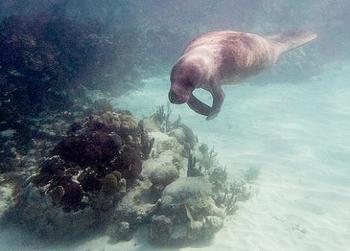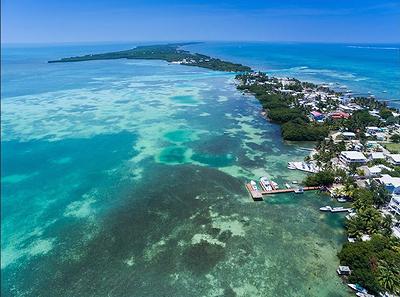
MANAMA, Bahrain, June 27, 2018 (ENS) – Conservationists around the world are celebrating the announcement by UNESCO’s World Heritage Committee Tuesday that the Belize Barrier Reef Reserve System – the world’s second largest coral reef system after the Great Barrier Reef – is officially off the List of World Heritage in Danger.
The World Heritage Committee, meeting this week in Bahrain, followed the advice of the International Union for Conservation of Nature, IUCN, in taking the Central American reef system off the Danger List.

“The aim of the World Heritage Danger List is to help focus action where it is most needed and today’s decision to lift the ‘in danger’ status of the Belize Barrier Reef Reserve System proves that it can be incredibly effective,” said Peter Shadie, IUCN senior adviser on World Heritage.
“Every natural World Heritage site should be granted the highest level of protection possible, and Belize provides an inspiring example of how national commitment combined with collective action can ensure that this is the case,” Shadie said.
The Belize Barrier Reef was added to the List of World Heritage in Danger in 2009 due to unsustainable hotel development that increased its vulnerability to erosion and severe storms.
Entire mangrove forests were cleared then, and replaced with sand and coral rubble extracted from nearby waters, destroying corals and seabed ecosystems.
Due to their destructive and irreversible impacts, oil, gas and mining industries are seen as incompatible with World Heritage status but for the past 10 years, the reef site has been facing the threat of potential oil activities.
In 2011, it became public that offshore oil concessions existed within the site, triggering an outcry from Belizeans.
Local efforts to halt the oil exploration were supported by a coalition that included WWF, Oceana, and the Belize Tourism Industry Association.
The government of Belize is listening. Over the last 18 months, the government has put in place protections to secure the Belize Barrier Reef from immediate threats.
Last December Belize announced a ban on oil drilling across all its marine territory, and reinforced the legal protection of its coastal mangroves, which help protect the shorelines from disasters due to climate change, keep the waters pristine and support local fisheries.

It was these decisions that led to today’s removal of the site from the list of World Heritage in Danger.
“Belize has demonstrated the kind of leadership that is urgently needed to increase the resilience of precious marine ecosystems to climate change, while fostering sustainable tourism,” says Tim Badman, director of IUCN’s World Heritage Programme.
“Its firm commitment to protecting the reef from oil threats and development impacts is a huge boost to this iconic World Heritage site, and to the local economy which depends on it,” Badman said.
While unsustainable development no longer threatens the integrity of the Belize Barrier Reef Reserve System, the site is increasingly exposed to climate change, with impacts such as coral bleaching, rising sea levels, beach erosion and hurricanes.
The 21-member World Heritage Committee is responsible for the implementation of the World Heritage Convention, defines the use of the World Heritage Fund and allocates financial assistance upon requests from the 193 nations that are Parties to the Convention.
The Committee has the final say on whether a property is inscribed on the World Heritage List. It examines reports on the state of conservation of inscribed properties and asks States Parties to take action when properties are not being properly managed.
It also decides on the inscription or deletion of properties on the List of World Heritage in Danger.
The 2018 UNESCO World Heritage Committee’s annual meeting runs through July 4. The Committee will decide on protections for outstanding natural and cultural sites based on proposals from Canada, China, Colombia, France, Iran, Mexico, Russia, and South Africa.
Copyright Environment News Service (ENS) 2018. All rights reserved.
© 2018, Environment News Service. All rights reserved. Content may be quoted only with proper attribution and a direct link to the original article. Full reproduction is prohibited.
